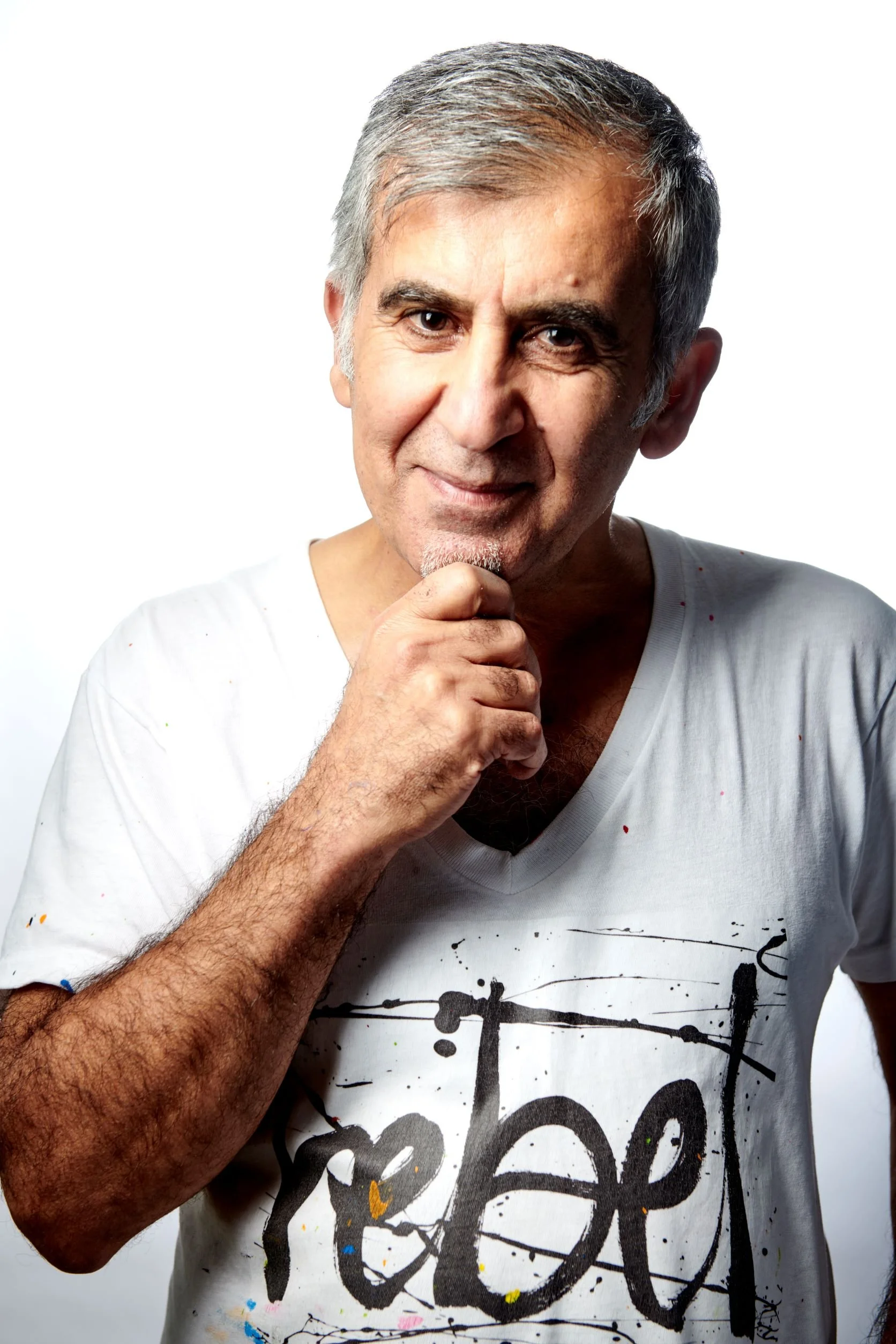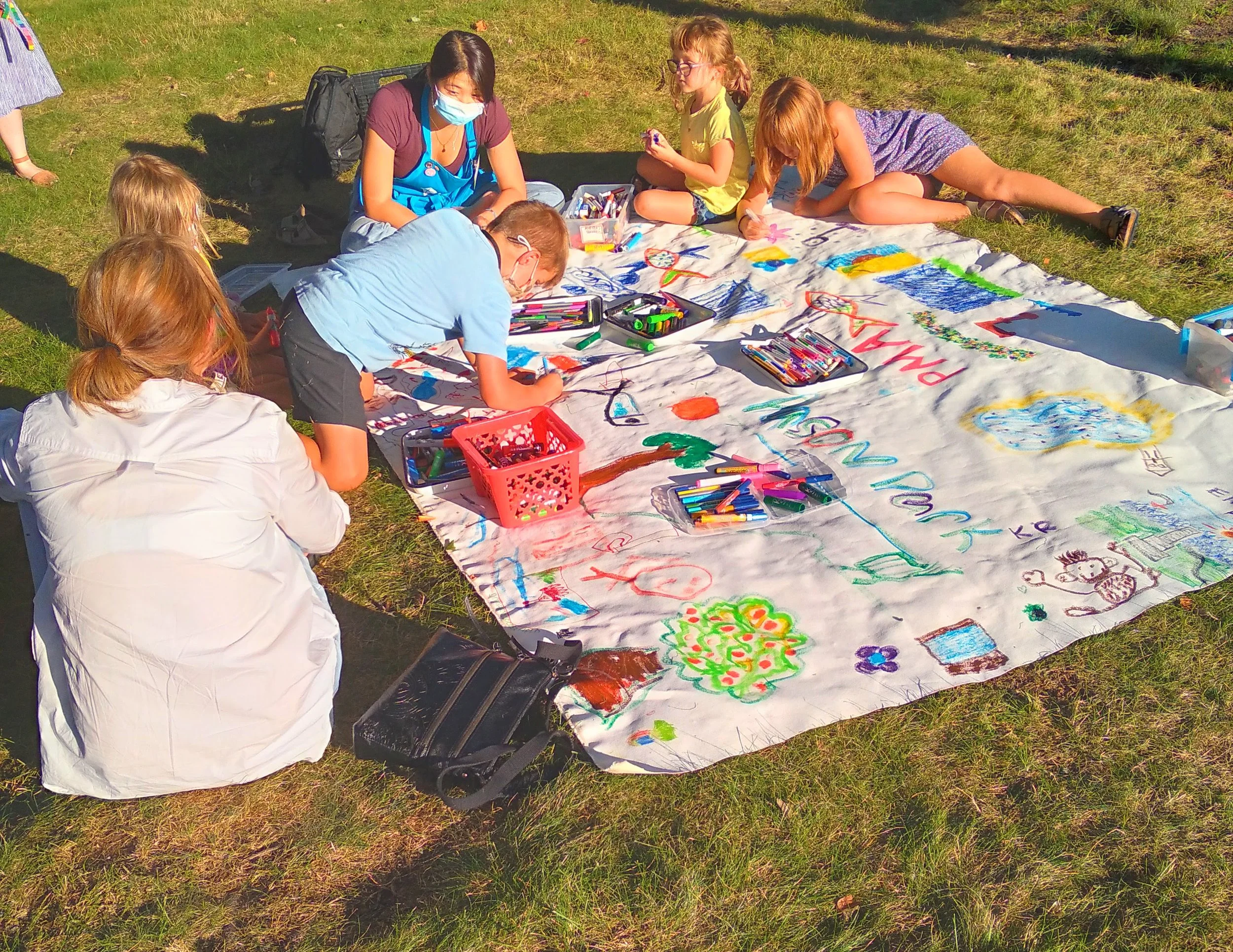Staff Spotlight: Kifah Abdulla
Kifah Abdulla is a Play Assistant.
When Kifah Abdulla was in fourth grade in Baghdad, his art teacher told him “You are an artist,” and invited him to the after school art program. It was the first time he experienced oil pastels and paints, instead of just colored pencils. That simple sentence changed his life, and now he tells children at the Museum & Theatre “You are an artist.”
As a Play Assistant, Kifah works in the MakerSpace and on Member Mondays he runs mural making in the Lobby. For the mural, pieces of paper are hung up on a mobile whiteboard and solid tempura, colored pencils and markers are offered as tools. Visiting children have free time to create, to add their sketches. The whiteboard is set up in the lobby close to the front desk.
Kifah laughs when describing how kids “jump” to the board while their parents stay in line to check in: “Kids get drawn in. The panel is by the window, and the kids are totally pulled to it and feel comfortable picking up the materials.”
The activity and the complete confidence of children who know this mural is for them, embodies the mission “You belong here” as soon as visitors come through the door.
Kifah has led mural projects for CMTM events and for other community organizations. For Welcoming Week 2021, in collaboration with Portland’s Office of Economic Opportunity and Wayside Food Programs, Kifah guided participants in making a collaborative community map of Portland. The large-scale mural asked participants to consider their favorite spots in Portland, and encouraged creative inclusion. He has also led community art workshops through The New England Arab American Organization. A blank canvas, especially a big one for a mural, can be intimidating and pressure might arise from the notion of doing something wrong. No matter the age of the participants, Kifah always encourages people just to start. Kifah points out, “There are no mistakes in art, no right or wrong. Creativity is not just a product but a process.”
Participants create a collaborate community map at Welcoming Week 2021
Visiting children have free time to create and add their sketches to the mural.
For Kifah, it is often about assuring people that they are artists and showing them their art has worth. He describes a woman in her 50s who he mentored at a workshop. With encouragement and some simple brushes and acrylic paints, she gained the confidence to start painting. Now with many art pieces in her portfolio, she told Kifah “You made my dream.” Kifah says, “This is my project, art for people. Sometimes they buy it as presents - why don’t you make art? And frame them and then give that? Your energy and spirit is in that work. It’s special. it’s you.” Kifah models this in the MakerSpace as well, telling children he values their art. It is not only important for the kids to hear, but their parents as well.
In high school, Kifah attended an art institute, and had the opportunity to continue his studies at an Art Academy. However, Kifah explains, due to the political climate in Iraq at the time, “I couldn't attend the Art Academy, because I was an activist against the dictatorial regime who controlled the art and education systems at that time. The art academy was closed for their members who were involved in their ideology. It was difficult for me to attend and I didn't want to be involved with them.” Kifah’s father also raised concerns about his career if he continued on to art school. So Kifah switched to biology, to pursue a career as a teacher. Years later, he returned to the arts, including writing and poetry, and his art activism.
Now Kifah describes himself as an experimental artist, exploring themes of racism, gun violence, and plastic pollution (the latter informed by his background in biology). His huge paintings are created with discarded objects dipped in paint, like plungers, dusters, plastic waste, used shoes, and brooms, challenging the constraints of traditional brushes. “Rebel”, his current series, encourages people to “take a good action.” The message is “For your life, the past is gone, go forward, invest your energy for today,” says Kifah, and encourages people to come together and start a conversation around the theme.
Kifah describes himself as an experimental artist.
“Art is a healing process, a way to make a balance. When you practice art the time is gone, you are free. We don’t need to just survive, we need to enjoy life. I don’t want to just survive. It’s simple things. You can find any materials. Just start - take action - take action for yourself. Today is the most important.”
He encourages people to put their emotions on the canvas - the mental to physical. In the MakerSpace as well, he encourages this self expression and imagination. “My philosophy in the MakerSpace is ‘do not wait for kids to ask for materials, just give them and you will see.’ Children naturally have a huge imagination and love the sensory experience.” Kifah’s appreciation for the creativity and imagination he witnesses at the Museum & Theatre is evident. He names masters of abstract art, including Pablo Picasso, Juan Muro, Cy Twombly, and Adolph Gottlieb, who were inspired by childhood imagination and the unbelievable scribbles of children’s art. “People say ‘Children imitate the masters’ - This is not true: the masters imitate the children.”
Read more about Kifah on his website, https://www.kifahabdulla.com/.




